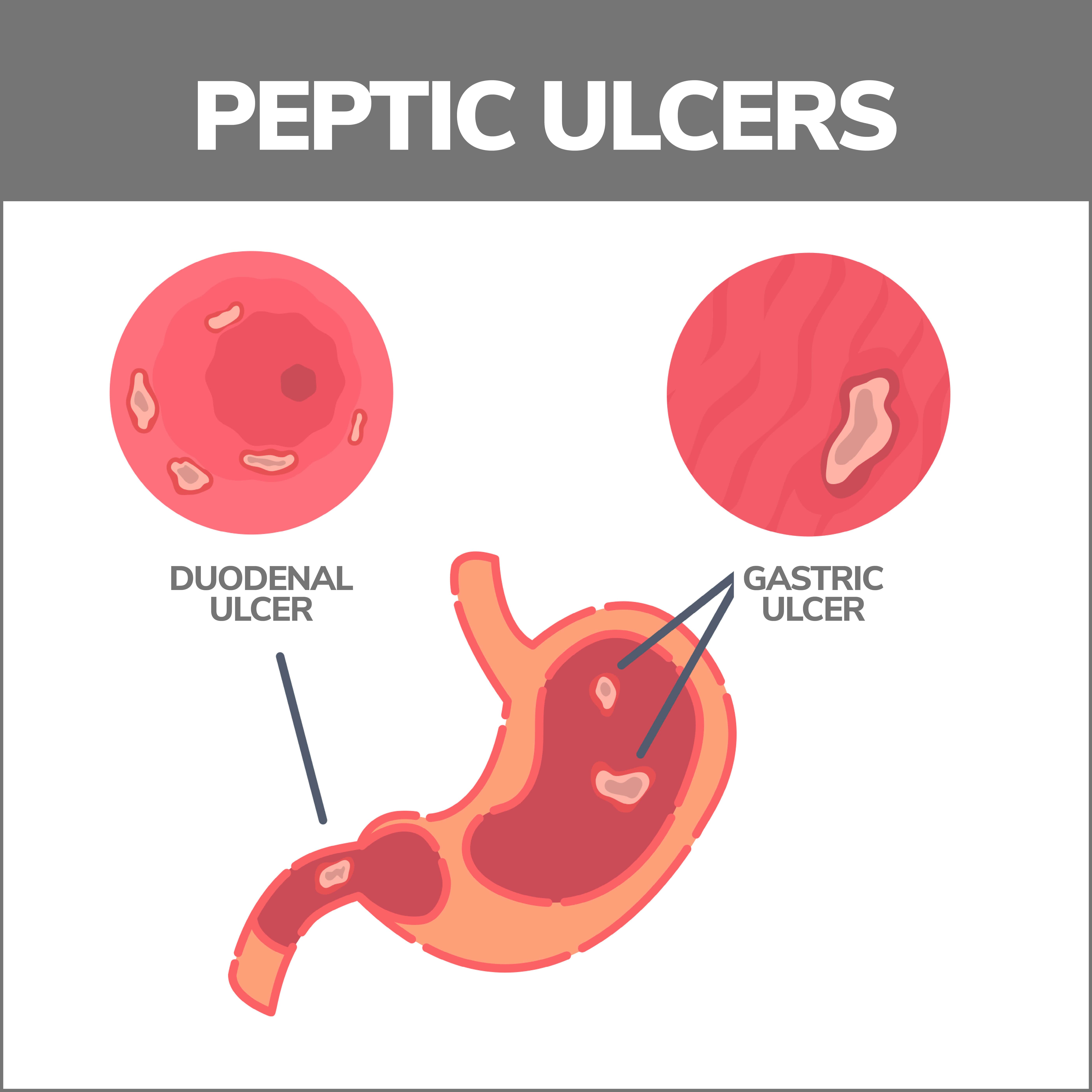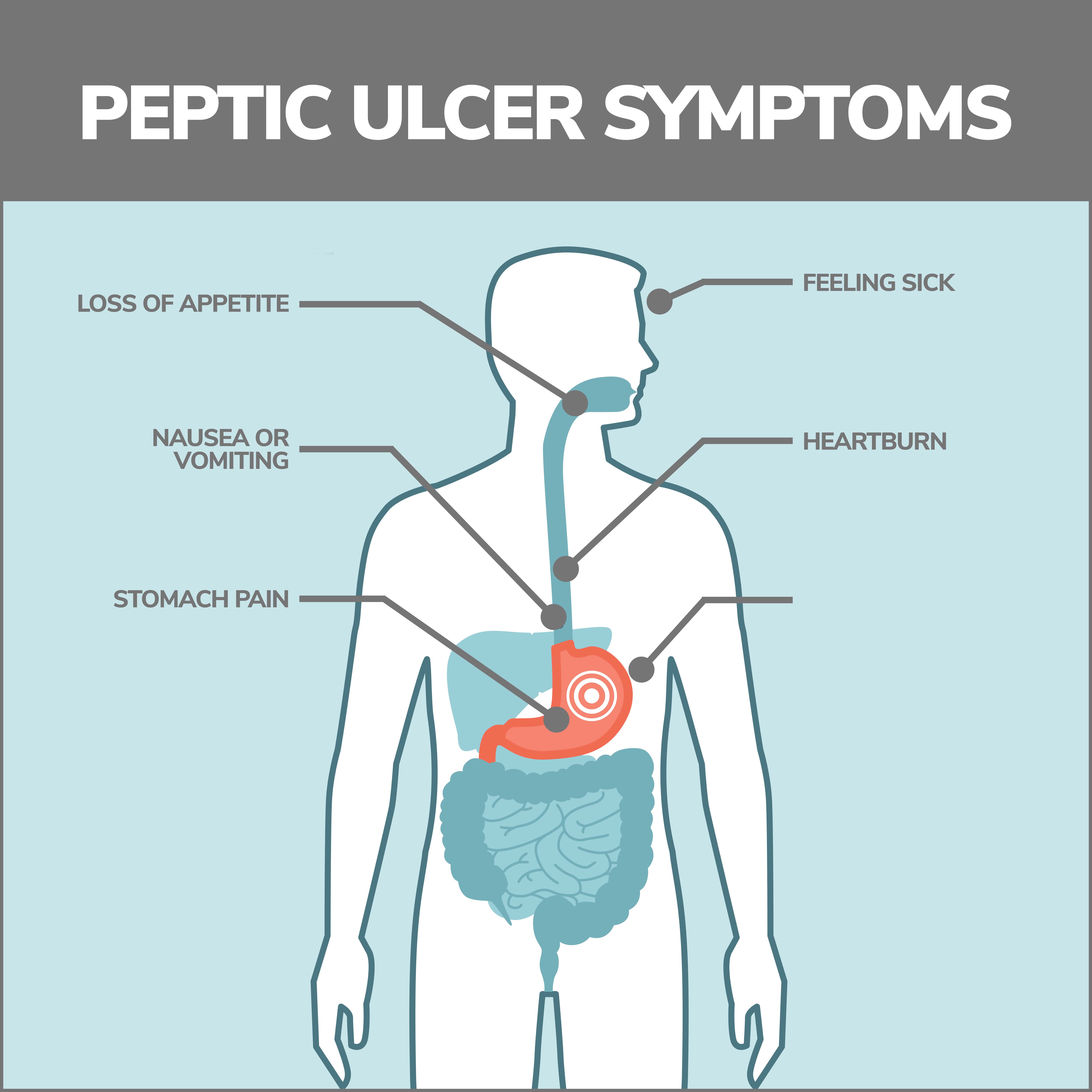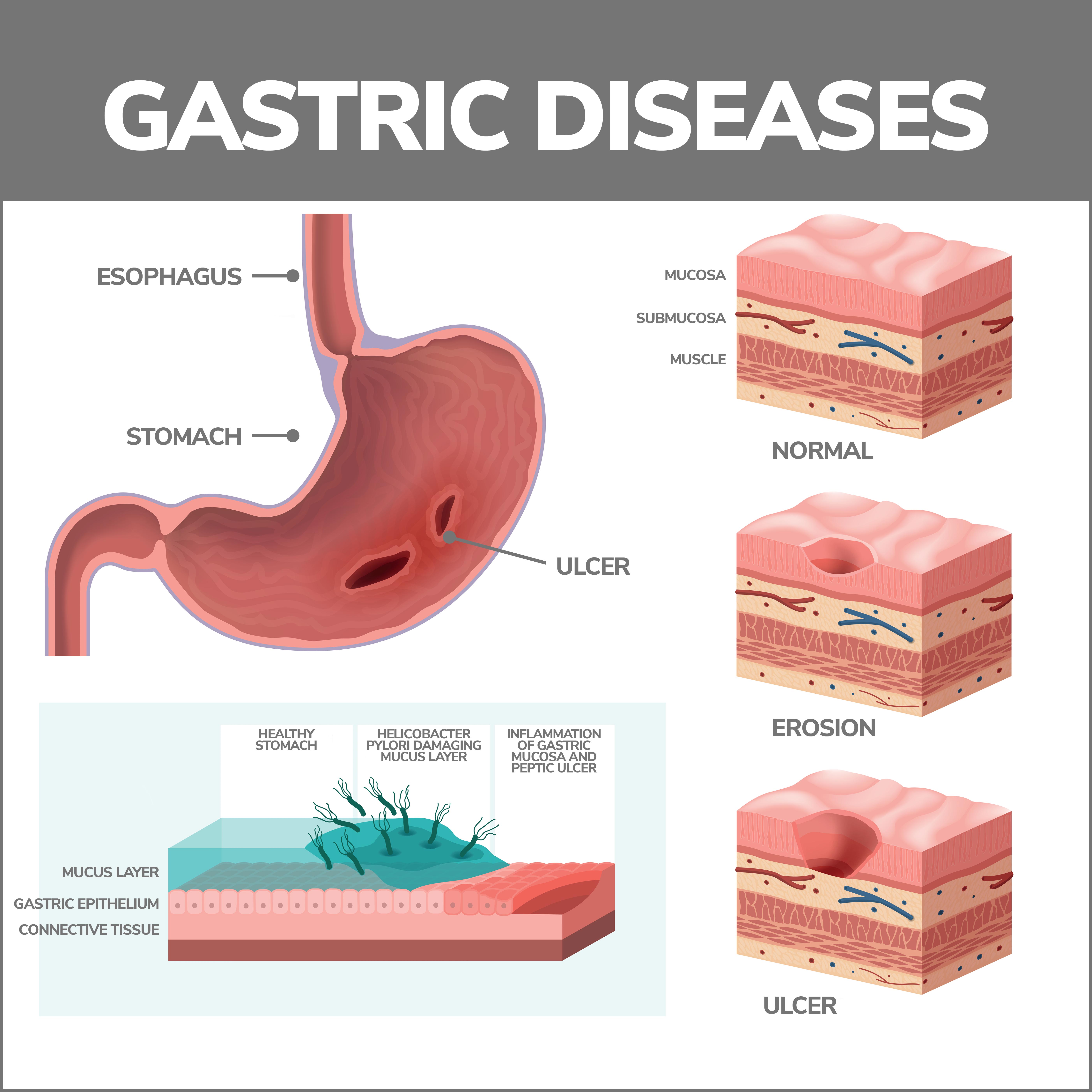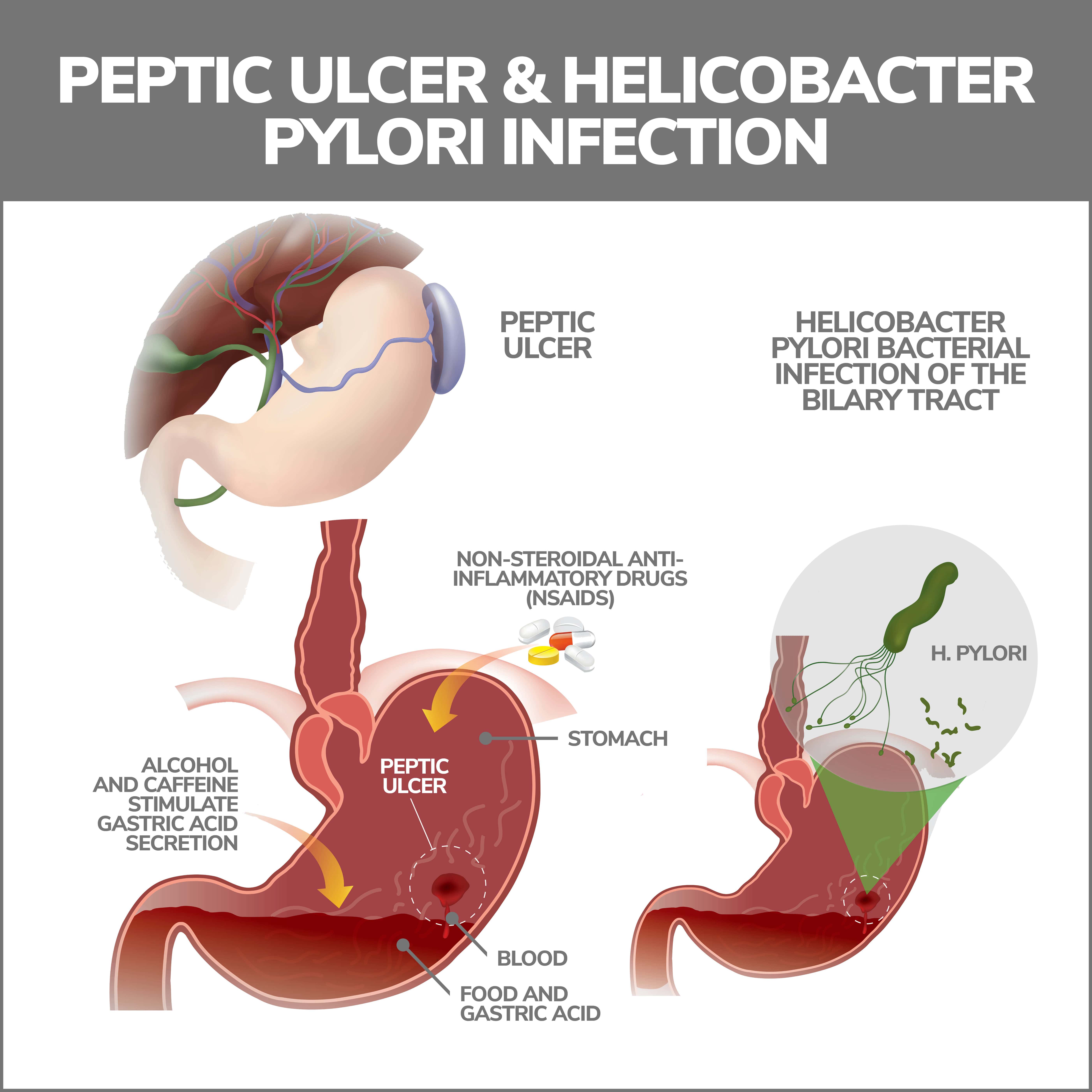
Understanding Stomach Ulcers and Prevention
Your digestive tract carries out several essential functions, such as digesting food, absorbing nutrients the body requires for life-sustaining tasks, and eliminating unnecessary and potentially detrimental waste products. Many conditions carry the ability to interfere with these critical duties. A stomach ulcer is one such condition.
Overview of Stomach Ulcers
Stomach ulcers are sores that develop along the stomach’s lining. In official medical terms, stomach ulcers are called peptic ulcer disease. The condition is so named because it is sometimes caused by pepsin, a type of gastric juice.
A mucous-covered lining protects your stomach. Time and other factors can gradually erode this layer, allowing stomach acid, digestive juices, and enzymes to weaken and destroy it.
Stomach ulcers are very common. This is especially true in the United States and western European nations. In the United States alone, doctors diagnose roughly four million cases each year. Moreover, about one out of every ten individuals will develop the problem during their lifetime.

Causes of Stomach Ulcers
Stomach ulcers have several causes, including:
- Overuse of Certain Medications – Certain drugs, particularly over-the-counter drugs known as non-steroidal anti-inflammatory drugs (NSAIDs), contain chemicals capable of irritating your stomach’s lining and interfering with the body’s ability to heal the protective covering. As many as 50% of all diagnosed incidents can be traced back to medicinal overuse.
- H. Pylori Infection – This bacterium is found in many people’s digestive tracts. It can remain dormant and not cause any problems, but sometimes the pathogen grows in excess and eats away at the stomach lining.
- Physical, Mental, or Emotional Stress – Chronic work-related tension, severe emotional turmoil, financial difficulties, and major illness often negatively impact digestive tract function resulting in stomach ulcers.
Your risk for developing peptic ulcer disease increases if you:
- Smoke.
- Consume Alcohol Excessively.
- Under great stress.
- Are obese.
- Consume large amounts of processed or spicy foods.
- Have high H. pylori count.
- Have other underlying gastrointestinal illnesses.
How Do I Know If I Have a Stomach Ulcer?
Symptoms vary from person to person.
You may not experience any physical symptoms with small ulcers. As they grow larger, the most common associated symptom is pain. Usually, this discomfort is a burning sensation felt in the stomach and upper abdominal region. Pain might be relieved by eating or by taking acid-reducing medications. The discomfort may intensify between meals, while lying down, and during the evening hours.
Other relatively common symptoms include:
- Bloating.
- Feeling full after consuming small quantities of food.
- Burping.
- Nausea.
- Appetite loss.
Sometimes, ulcer-related pain may be felt in the chest resulting in an ailment known medically as heartburn.

Complications of Ulcers in Your Stomach
If not diagnosed and treated in their earliest possible stages, stomach ulcers carry the potential to result in complications, such as:
- Bleeding – Stomach lining erosion can eventually lead to internal bleeding. In some instances, bleeding occurs slowly and in small concentrations. If stomach damage is severe enough, large quantities of blood can be lost, resulting in a medical emergency. Ulcer-related blood is occasionally vomited. It often travels through the gastrointestinal network and is excreted in the form of black stools that appear to look like tar.
- Gastric Obstruction – In severe cases, ulcers sometimes interfere with food’s normal digestive tract passageways leading to pain, vomiting, and nutritional deficiencies.
- Stomach Perforation – Ulcers can grow so pronounced that they eat a hole in the stomach – medically termed a perforation. Perforations can result in significant systemic infections and require immediate and aggressive treatment.
- Stomach Cancer – You are at greater risk of developing stomach cancer if you hold a high H. pylori count.
- Anemia – Ulcers causing gradual blood loss can lead to anemia, meaning your body lacks adequate red blood cells. These blood components are crucial to ensure the body’s cells and tissues receive the oxygen they need to execute needed functions.
- Nutritional Deficiencies – When gastric ulcers disrupt the normal digestive flow, the body does not receive an adequate intake of essential nutrients like vitamins and minerals. Over time, nutritional deficiencies will result in many bothersome and potentially serious symptoms.

Diagnosis
Diagnosis is a multi-step process.
During the first stage, your doctor gathers information about your medical history, symptoms, and the type of medications you regularly take. If a stomach ulcer may be present, they will order one or more diagnostic tests, including:
- Barium Swallow – You drink a special liquid designed to coat the digestive tract and help doctors identify any visible abnormalities on X-rays.
- Endoscopy – This test is completed using a small tube-like device equipped with a camera called an endoscope. The images help your doctor diagnose ulcers or other anomalies.
- H. Pylori Measurement Tests – Physicians can determine the amount of H. pylori inside your gastrointestinal system through a variety of breath, stool, and blood tests.

Stomach Ulcers Treatment Options
Treatment will depend on the ulcer’s size and location and if it has resulted in any complications. Simple cases might be managed through lifestyle and dietary changes and acid-reducing drugs. Severe instances need surgery to control bleeding or remove damaged surrounding tissues.
Lifestyle Changes That Will Prevent Stomach Ulcers
You may find relief or reverse problems created by stomach ulcers by making lifestyle changes such as:
- Consuming a Healthy Diet – Certain foods not only provide significant nutritional value and are easier on your digestive tract but also reduce or eradicate H. pylori, including:
- Leafy green vegetables like broccoli and kale.
- Broccoli.
- Cauliflower.
- Radishes.
- Cabbage.
- Apples.
- Berries.
- Olive oil.
- Foods high in probiotics, such as sauerkraut, miso, and yogurt, have been known to help the gut maintain healthy bacterial flora.
- Spicy or acidic foods should be eaten sparingly, if at all.
- Use Medications as Directed – Drugs like NSAIDs should be used only as directed and for a limited amount of time. If stomach ulcers can be traced to medicinal overuse, stop using the offending drug or ask your doctor to find a suitable alternative.
- Limit Stress – You may not be able to avoid all stress. But whenever possible, you are strongly urged to get rid of all unnecessary stress sources. Identify productive stress-alleviating hobbies.
- Get Regular Checkups – Ulcers can be asymptomatic for years or mimic other less serious digestive issues. You should schedule routine checkups with your doctor to ensure the problem is diagnosed and treated at its earliest possible stage.
Contacting Us
If you believe you may have an ulcer, the experienced team of gastroenterologists at Gastroenterology of Greater Orlando urges you to reach out. Our practice began more than 15 years ago and has emerged as one of the leading gastroenterology practices in central Florida. We perform a host of diagnostic procedures using state-of-the-art equipment in a friendly, comfortable, and inviting atmosphere where patient care is always a top priority. Contact us today!